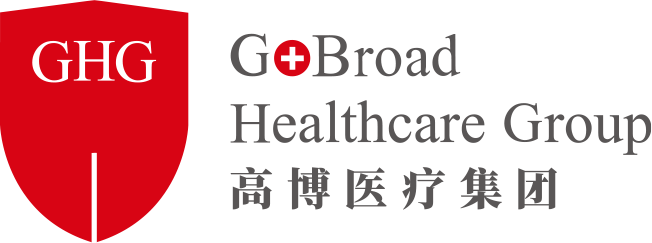PPSSC Newsletter
Director Chunrong TONG and Director Tong WU Were Invited to Attend the 12th Pan Pacific Symposium on Stem Cells and Cancer Research and Gave a Keynote Speech
PPSSC Newsletter Director Chunrong TONG and Director Tong WU Were Invited to Attend the 12th Pan Pacific Symposium on Stem Cells and Cancer Research and Gave a Keynote Speech
(May 4, Taiwan, China) The 12th Pan Pacific Symposium on Stem Cells and Cancer Research (PPSSC 2019) is being held at Hualien Tzu Chi Hospital, Taiwan. Over the years, the PPSSC has attracted heavyweight masters and experts in stem cell research from many countries around the world to share breakthroughs in stem cell research and the achievements in clinical trials on stem cells, and the content covers basic research and clinical trials. Here, the participants will see the exciting achievements and appreciate the potential applications of stem cells.
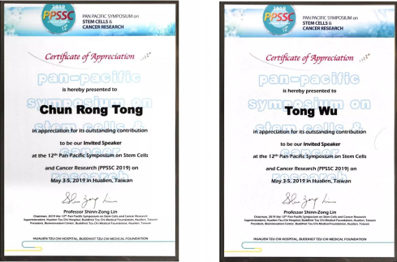
Certificates of Appreciation for Direct Chunrong TONG and Director Tong WU
Director Chunrong TONG and Director Tong WU from Beijing Boren Hospital attended the PPSSC 2019 as guest speakers and brought keynote speeches "CAR-T therapy for hematological malignancies: clinical outcome and experience in our hospital" and "New Strategy for Refractory/Relapsed B-ALL: Combination of CAR-T and Allo-HSCT”, respectively. The conference was packed, and the reports of the two directors attracted wide attention and heated discussion of the participating experts. They actively demonstrated the research achievements and clinical experience of Boren to the world, and the Beijing Boren Hospital's outstanding achievements in CAR-T therapy and CAR-T therapy combined with hematopoietic stem cell transplantation have been widely praised and recognized.
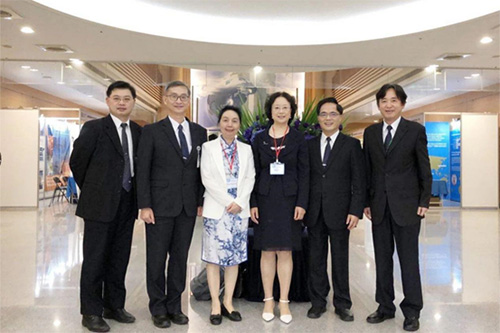
Photo of Director Chunrong TONG (third from the left), Director Tong WU (third from right), the Chairman of the Conference and Xinrong LIN, President of Tzu Chi Hospital (second from the right).
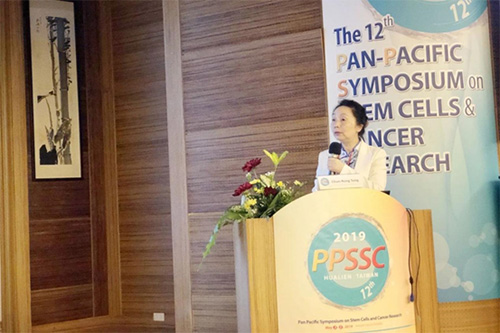
Director Chunrong TONG: CAR-T therapy for hematological malignancies: Clinical Outcome And Experience in Our Hospital
Director Chunrong TONG's On-site Report
Director Chunrong TONG brought a report: "CAR-T therapy for hematological malignancies: clinical outcome and experience in our hospital”. Director Chunrong TONG first shared the seven clinical trials registered by the research team in Beijing Boren Hospital since July 2017 and pointed out that the structure of CAR used by the research team is the second-generation murine/humanized CAR with lentiviral vector as the structure and 4-1BB (CD137) as the second signal.
Director Tong introduced the efficacy of CD19-CAR-T cell therapy in 101 patients with refractory/relapsed B-ALL enrolled from June 2017 to October 2018, they were followed up to March 15, 2019, the median age was 6 (1-59) years old, the median myeloid blast percentage was 30% (5%-97.5%), the median follow-up time was 433 (152-659) days, and the median infused CAR-T cell count was 1×10^5/kg. Results: The 30-day complete remission rate was 98%, the 30-day MRD negative rate was 97% (flow cytometry), and the median grade of CRS was 2. Of the 98 patients achieving complete remission, 73 underwent bridging transplantation and 16 received sequential CD22-CAR-T therapy, the 1-year overall survival rate was 90%, and the 1-year relapse-free survival rate was 78%. One patient received targeted therapy, 5 did not receive further therapy, and 3 were lost to follow-up.
Director Chunrong TONG also shared the research team's clinical outcomes and experience in the treatment of refractory/relapsed B-ALL with autologous humanized CD22-CAR-T cell therapy. From June 2017 to October 2018, 19 patients with refractory/relapsed B-ALL were enrolled, with a median age of 8 (2-37) years old, they were followed up to March 15, 2019, the median follow-up time was 512 days, and the median infused CAR-T cell count was 6×10^5/kg. Results: The 30-day complete remission rate was 77%, the 30-day MRD negative rate was 72% (flow cytometry), 1 patient died of pneumorrhagia, and the median grade of CRS was 2. Of the 14 patients achieving complete remission, 12 underwent bridging transplantation, the 1-year overall survival rate and relapse-free survival rate was 86%.
Finally, Director Tong shared the clinical outcomes of 11 patients with refractory/relapsed AML/CML-BP who received CD19 or CD22-CAR-T therapy, 7 patients with refractory/relapsed DLBCL who received sequential CD19-CAR-T, 22-CAR-T and 20-CAR-T therapies and 6 patients with refractory/relapsed BL who received sequential CD19-CAR-T, 22-CAR-T and 20-CAR-T therapies. Finally, Director Chunrong TONG concluded that CAR-T therapy is a powerful and effective treatment for hematological malignancies, especially B-cell malignancies, but a single target is difficult to cure, and bridging transplantation or sequential CAR-T therapy can increase the response rate and improve the survival.
When talking about the experience in CAR-T therapy for hematological malignancies, Director Chunrong TONG shared that targets should be selected very carefully in CAR-T therapy. The selection criteria for targets are with expression in tumor cells and no expression in normal cells. Currently, few antigens have this characteristic, so limited targets is also one of the main reasons for limited development of CAR-T therapy. At present, excellent targets are mainly in B-cell malignancies, the best target is CD19, and other potential targets include BCMA expressed on myeloma cells, as well as CD22 and CD20. These are targets expressed on B cells. In addition, the main side effect of CAR-T therapy is CRS (cytokine storm), and for prevention and treatment of CRS, it must be clinically predictable to identify high-risk factors of CRS. For example, for patients with high tumor burden, it is recommended to reduce the tumor cell count by chemotherapy. If tumor invasion of the central nervous system produces a serious CRS in the brain that is fatal, we would routinely perform head magnetic resonance imaging and cerebrospinal fluid test before CAR-T therapy. If the central nervous system has a high tumor burden, it is recommended that it should not be treated with CAR-T therapy immediately, and intrathecal injection of drugs should be given to reduce intracranial tumors and then CAR-T therapy could be given. In addition, CAR-T therapy can reduce the number of B cells and immunoglobulins, which may aggravate the infection. Therefore, if the infection is not controlled, CAR-T therapy should not be given, and it could be given after the infection is controlled. In short, CRS should be predicted and timely identified in clinical practice. The occurrence of CRS should be reduced as much as possible.
Director Tong WU: New Strategy for Refractory/Relapsed B-ALL: Combination of CAR-T and Allo-HSCT
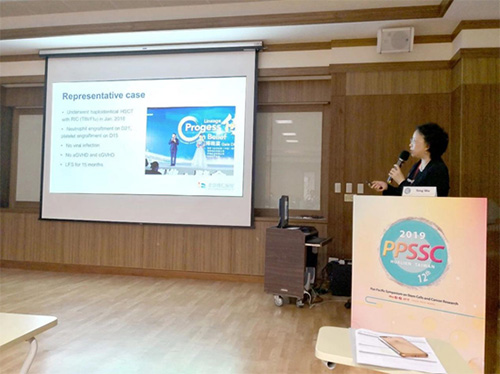
Director Tong WU's On-site Report
Director Tong WU brought "New Strategy for Refractory/Relapsed B-ALL: Combination of CAR-T and Allo-HSCT” to share the experience in “bridging allogeneic HSCT (Allo-HSCT) after remission by CAR-T therapy” and “sequential CAR-T therapy for relapse after Allo-HSCT”.
Bridging Allo-HSCT After Remission by CAR-T Therapy
Director Tong WU mentioned that refractory/relapsed B-ALL has poor prognosis, only 30% of patients receiving salvage chemotherapy can achieve CR, and the LFS of salvage Allo-HSCT is only about 20%-30%. Many studies have demonstrated that CD19-CAR-T therapy could make 70%-90% of patients with refractory/relapsed B-ALLs achieve CR, but most of them relapsed subsequently. It is still controversial whether bridging Allo-HSCT after remission by CAR-T therapy can improve the LFS. Therefore, we included the patients refractory/relapsed B-ALL after remission by CAR-T therapy and gave bridging Allo-HSCT to evaluate its efficacy and safety.
From August 2017 to November 2018, a total of 52 patients with refractory/relapsed B-ALL who received bridging Allo-HSCT after remission by CAR-T therapy were included in the study. The median age of the patients was 8 (1-42) years old, and the median time from back infusion of CAR-T cells to Allo-HSCT was 50 (34-98) days. Twenty-two patients (42.3%) had abnormal cytogenetic or molecular level of poor prognosis. Most patients (n=40, 76.9%) underwent related haploidentical transplantation. Graft-versus-host disease (GVHD) and infection were prevented routinely after transplantation.
Results: The median follow-up time was 326 (41-479) days, and 46/52 of patients survived. The 1-year overall survival rate was 87.7% (95% CI = 72.8%-94.7%), and the 1-year leukemia-free survival rate was 73% (95% CI = 53.0%-85.6%). Director Tong WU shared a typical case with the participants. A 25-year-old female patient was diagnosed with B-ALL in February 2014 and relapsed in September 2017, 70% of bone marrow cells were leukemia cells, with complex karyotypes, and re-induction chemotherapy was ineffective. On November 20, 2017, the patient received CD22-CAR-T therapy, the disease was evaluated as CR at 15 and 30 days after treatment, and residual leukemia was not detected. In January 2018, myeloablative pretreatment was given, then the haploidentical transplantation was performed, the hematopoietic reconstitution was successful, no GVHD and infection occurred after transplantation, and currently, the disease-free survival reached 15 months. Director Tong WU concluded that rapid bridging Allo-HSCT and the adopted optimized haploidentical transplantation protocol after CR was achieved by CAR-T therapy for refractory/relapsed B-ALL were the key factors for good efficacy of transplantation and significantly improved the survival of patients with refractory/relapsed B-ALL, and long-term follow-up was needed to observe the long-term efficacy.
Sequential CAR-T Therapy for Relapse After Allo-HSCT
Director Tong WU then shared the clinical outcome of sequential CAR-T therapy for relapse after Allo-HSCT. Director Tong WU pointed out that the traditional treatment of relapsed ALL after Allo-HSCT had very poor prognosis, and new therapies should be explored. Our study showed that CD19-CAR-T cell therapy had significant efficacy on refractory/relapsed B-ALL (rrB-ALL), but single-target CART therapy might still lead to a high relapse rate, and it was difficult to maintain long-term remission. In recent years, CAR-T targeting CD22 has also shown good efficacy on rrB-ALL. Therefore, we used sequential CD19 and CD22-CAR-T therapies to treat relapsed B-ALL after Allo-HCT, expecting to improve the long-term relapse-free survival rate.
From June 2017 to October 2018, a total of 32 patients with relapsed B-ALL after Allo-HSCT were included in the study. Their leukemia cells were confirmed by flow cytometry to express both CD19 and CD22 antigens; the median age of the patients was 22 years old (2-55 years old), and the CAR-T cell infusion volume was 1.3 (0.4-9.2)×10^5/kg for CD19 and 1.9 (0.55-6.6)×10^5/kg for CD22, and the interval between the two CAR-T therapies was 1.5-6 months. Of the 32 patients enrolled, 24 completed sequential CD19 and CD22-CAR-T therapies and were followed up for observation, and the median follow-up time was 10 months (4.5-15 months).
Results: 84.4% of patients with relapsed B-ALL after Allo-HCT achieved MRD-negative CR one month after the first CART therapy, and another sequential CART therapy could significantly improve the long-term survival rate. In 24 patients followed up for median 10 months after sequential CD19 and CD22 CAR-T therapies, the overall survival rate and the MRD-negative survival rate were 87.5% and 58.3%, respectively, and the median event-free survival (EFS) was 12.5 months. It significantly improved the survival in comparison with the effects obtained from traditional treatment regimens.
The reports of the two directors covered the hot topics of CAR-T therapy and CAR-T therapy combined with hematopoietic stem cell transplantation theoretically and practically, and they provided a new way of thinking to the participants and broadened the clinical thinking through real-world clinical case sharing. Meanwhile, Beijing Boren Hospital has won praise and recognition from the industry for its excellent achievements in treating refractory and relapsed B-ALL. Beijing Boren Hospital always adheres to the all-round development of clinical and scientific research and leads the hospital development with academic spirit. Beijing Boren Hospital is characterized by integrated medicine, cellular immunotherapy, targeted therapy, hematopoietic stem cell transplantation and accurate diagnosis, constantly explores new technologies and methods to maximize the therapeutic effect, and brings hopes to many patients with blood diseases.
Request an Appointment
Whether you are ready to make an appointment now or have questions for our expert team, we are standing by to help.
Email: international.service@gobroadhealthcare.com Phone: +86 010-83605002/010-83605200 Online Access









